
Economics & Human Biology
Scope & Guideline
Analyzing the Dynamics of Health Disparities and Economics
Introduction
Aims and Scopes
- Economic Determinants of Health:
Research focuses on how economic variables such as income, employment, and social welfare impact health outcomes and behaviors. This includes studies on the effects of economic policies on public health, healthcare access, and individual health metrics. - Human Biology and Demographic Studies:
Investigations into how human biological factors, including genetics and physical characteristics, influence socioeconomic status and health outcomes. This area often involves cross-sectional and longitudinal studies that analyze demographic trends. - Health Inequality and Disparities:
Exploration of health disparities across different demographic groups, including socioeconomic, racial, and geographic disparities. The journal publishes analyses on the social determinants of health and the impact of public health interventions. - Public Health Interventions and Policy Analysis:
Examines the effectiveness of public health policies and interventions, particularly in response to crises such as pandemics. This includes evaluations of health programs and their economic implications. - Cultural and Behavioral Influences on Health:
Studies that assess how cultural norms and behaviors influence health outcomes, including the impact of lifestyle choices on public health metrics.
Trending and Emerging
- Mental Health and Economic Factors:
There is an increasing focus on the intersection of mental health and economic conditions, particularly in the context of the COVID-19 pandemic, highlighting how economic stressors affect psychological wellbeing. - Impact of Environmental Factors on Health:
Research is trending towards understanding how environmental issues, such as air pollution and climate change, influence health outcomes, indicating a growing recognition of environmental determinants of health. - Digital Health and Technology:
The role of digital technology in healthcare, including telemedicine and digital health interventions, is gaining traction, particularly in response to the challenges posed by the pandemic. - Intergenerational Health Effects:
Studies examining how health outcomes and behaviors are transmitted across generations are becoming increasingly prominent, reflecting an interest in the long-term impacts of early-life conditions. - Socioeconomic Mobility and Health:
Emerging research is focusing on the relationship between socioeconomic mobility and health outcomes, exploring how changes in social status impact health across the lifespan.
Declining or Waning
- Traditional Economic Models of Health:
There has been a noticeable reduction in studies strictly adhering to classical economic models to explain health outcomes, as newer interdisciplinary approaches gain prominence. - Single-Country Case Studies:
Research that focuses exclusively on individual countries without comparative or cross-national perspectives has diminished, as there is a growing emphasis on global health issues and comparative analyses. - Historical Health Data Analysis:
While historical analyses provided valuable insights, the focus on historical health data has waned in favor of contemporary studies that address current health crises and their immediate impacts. - Static Health Metrics:
Research relying solely on static health metrics, such as BMI or mortality rates, without considering dynamic factors or longitudinal changes, is becoming less common, as there is a push for more nuanced, multi-dimensional health assessments. - Narrow Biostatistical Approaches:
Studies that solely utilize biostatistical methods without integrating socio-economic or behavioral contexts are less frequently published, reflecting a shift toward more holistic research methodologies.
Similar Journals

Journal of Racial and Ethnic Health Disparities
Advancing Equity in Health ResearchJournal of Racial and Ethnic Health Disparities is a prestigious academic journal published by SPRINGER INTERNATIONAL PUBLISHING AG, dedicated to advancing the understanding of health disparities among racial and ethnic groups. With an exemplary impact across multiple disciplines, the journal is categorized in the Q1 quartile across fields such as Anthropology, Health Policy, and Public Health, indicating its significant contribution to these areas. Since its inception in 2014, the journal has become a key resource for researchers, practitioners, and policymakers, fostering critical discussions and innovative research aimed at addressing the inequalities in health and healthcare access experienced by diverse populations. Although it does not offer open access, the journal ensures high-quality peer-reviewed content that serves as a vital reference within the academic community. Readers can explore in-depth analyses and evidence-based perspectives that not only highlight urgent health issues but also propose solutions that can lead to equitable health outcomes for all.
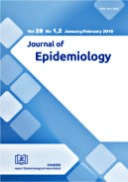
JOURNAL OF EPIDEMIOLOGY
Empowering the epidemiology community with knowledge.JOURNAL OF EPIDEMIOLOGY is a premier peer-reviewed journal published by the JAPAN EPIDEMIOLOGICAL ASSOCIATION dedicated to advancing the field of epidemiology and public health. With an impressive impact factor and recognition as a Q1 journal in both the epidemiology and miscellaneous medicine categories, it ranks in the top percentile of its field, occupying the 28th position out of 148 journals in epidemiology according to Scopus. Since its inception in 1991, this open access journal has provided researchers, practitioners, and students with valuable insights and findings that shape healthcare policies and practices globally. The journal covers a broad range of topics within epidemiology, fostering a multidisciplinary approach to understanding and addressing health challenges. With a commitment to high-quality research and accessibility, the JOURNAL OF EPIDEMIOLOGY plays a crucial role in the dissemination of knowledge and best practices within the public health community.
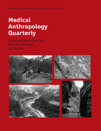
MEDICAL ANTHROPOLOGY QUARTERLY
Navigating the Dynamics of Medical Practices GloballyMedical Anthropology Quarterly is a premier academic journal published by Wiley, dedicated to advancing the interdisciplinary field of medical anthropology. With an ISSN of 0745-5194 and an e-ISSN of 1548-1387, this highly esteemed journal encompasses a wide array of topics at the intersection of health, culture, and society, reflecting the complexities of medical practices across diverse populations. As a testament to its impact, it boasts a Q1 ranking in Anthropology and a strong performance in related fields, landing at #37 in Social Sciences Anthropology according to Scopus rankings, placing it in the top 92nd percentile of its category. Published quarterly, Medical Anthropology Quarterly serves as a critical platform for researchers, professionals, and students alike, fostering rigorous academic discourse and providing insights relevant to contemporary health issues. While it does not offer open access options, the journal's wide circulation and esteemed reputation make it an invaluable resource for anyone engaged in the study of health and culture. Join the ongoing scholarly conversation that shapes our understanding of health in a global context, as we continue to explore the dynamic interplay between medical practices and human experiences.
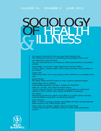
SOCIOLOGY OF HEALTH & ILLNESS
Advancing Insights into Health and SocietySociology of Health & Illness is a leading academic journal published by Wiley, dedicated to exploring the intricate relationships between health, illness, and society. With an ISSN of 0141-9889 and an e-ISSN of 1467-9566, this journal has established a significant presence since its inception in 1979, continuing to provide valuable insights through to 2024. Recognized in the Q1 quartile across multiple categories, including Health Policy, Health (Social Science), and Public Health, Environmental and Occupational Health, it ranks impressively at 52nd in Social Sciences and holds a robust reputation with a Scopus classification that places it within the top percentiles of its field. The journal’s objectives focus on publishing high-quality research that advances understanding of the social determinants of health and their implications, making it indispensable for scholars, professionals, and students committed to health-related research. Operating from its headquarters in the United Kingdom, **Sociology of Health & Illness** contributes significantly to the global discourse on health and social welfare, reinforcing its vital role in shaping knowledge and policy in health and social sciences.
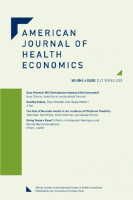
American Journal of Health Economics
Transforming data into impactful health strategies.The American Journal of Health Economics is a premier academic publication dedicated to advancing the understanding of the economic aspects of health and healthcare. Published by the University of Chicago Press, this journal has established itself as a vital resource for researchers, policymakers, and health professionals since its convergence in 2015. With an impressive Q1 ranking in key categories—including Economics, Health Policy, and Public Health—and a solid reputation in the academic community, it ranks in the top 20% for Economics and Health Policy in the Scopus database. The journal seeks to publish high-quality, peer-reviewed articles that contribute to the discourse on health economics, addressing critical issues like health disparities, policy evaluation, and the efficiency of healthcare systems. Although it does not offer open access, subscribers can access groundbreaking research that shapes health economic strategies and practices. As a trusted source in its field, the American Journal of Health Economics plays a crucial role in fostering evidence-based decision-making and enhancing the impact of economic research in healthcare.
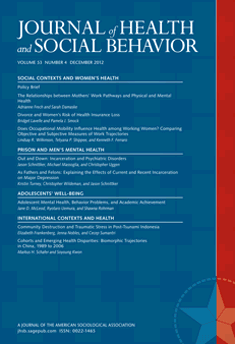
JOURNAL OF HEALTH AND SOCIAL BEHAVIOR
Connecting Research to Real-World Health IssuesThe Journal of Health and Social Behavior, published by SAGE Publications Inc, is a premier scholarly journal established in 1967 that critically examines the interplay between social factors and health outcomes. With a focus on public health, environmental and occupational health, as well as social psychology, this esteemed journal stands out with a 2023 Q1 ranking in both fields and an impressive Scopus ranking of 22nd in Social Psychology and 51st in Public Health, placing it in the top percentiles of academic excellence. Researchers, practitioners, and students alike will find valuable insights through its rigorous peer-reviewed articles, which span a wide array of topics relevant to contemporary societal health issues. While the journal is not open access, it remains a crucial resource for those seeking to deepen their understanding of the social determinants of health and the psychological aspects influencing health behaviors. Based in the United States, at 2455 Teller Rd, Thousand Oaks, CA 91320, the Journal of Health and Social Behavior continues to foster scholarly conversations and advance knowledge in its pivotal fields.

JOURNAL OF EPIDEMIOLOGY AND COMMUNITY HEALTH
Illuminating the path to healthier populations since 1978.JOURNAL OF EPIDEMIOLOGY AND COMMUNITY HEALTH, published by the esteemed BMJ PUBLISHING GROUP, stands as a leading journal in the fields of Epidemiology and Public Health. With an impressive impact factor and ranking in the Q1 quartile for both Epidemiology and Public Health categories as of 2023, it significantly contributes to the dissemination of critical research that shapes public health policies and practices globally. The journal has been a vital resource since 1978, continuously providing an academic platform for the latest advancements and discussions pertinent to community health, environmental concerns, and epidemiological studies. Researchers, professionals, and students alike depend on this influential publication for rigorous peer-reviewed articles, thereby enhancing its reputation as one of the top journals in the field. Despite the absence of Open Access options, the journal's scholarly contributions are evident, making it indispensable for anyone engaged in public health and epidemiological research.
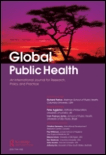
Global Public Health
Driving evidence-based strategies for a healthier planet.Global Public Health is a leading open-access journal published by Routledge Journals, part of Taylor & Francis Ltd, dedicated to advancing the field of public health and related environmental studies. With an impressive Q1 ranking in the categories of Public Health, Environmental and Occupational Health, this journal serves as a vital platform for disseminating high-quality research that addresses pressing global health challenges. Since its launch in 2006 and its transition to open access in 2023, it has fostered a rich dialogue among researchers, practitioners, and policy-makers, contributing to evidence-based interventions and strategies that enhance population health. With a commitment to accessibility, articles are available to a broad audience, ensuring that impactful research reaches those who need it most. Located in the United Kingdom, the journal reflects the international nature of public health issues and promotes collaborations across borders. Researchers and professionals in the field are encouraged to contribute to and engage with the innovative insights presented in this esteemed publication.
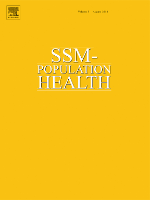
SSM-Population Health
Fostering knowledge sharing in population health.SSM-Population Health, published by ELSEVIER SCI LTD, stands as a prestigious platform dedicated to advancing our understanding of population health dynamics. As an Open Access journal since 2015, it fosters a culture of knowledge sharing, allowing researchers, professionals, and students to access high-quality research without barriers. With exceptional rankings in the 2023 category quartiles—Q1 in Health Policy, Health (social science), and Public Health, Environmental and Occupational Health—the journal emphasizes its influential role in shaping public health discourse and policy. Its notable Scopus rankings place it in the top deciles of various health-related fields, underlining its impact on contemporary health issues and research. SSM-Population Health invites contributors to address pressing questions and solutions within the realm of population health, making it a vital resource for those aiming to make an impact in this ever-evolving field.
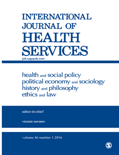
INTERNATIONAL JOURNAL OF HEALTH SERVICES
Elevating health policy discussions with empirical evidence.The INTERNATIONAL JOURNAL OF HEALTH SERVICES, published by SAGE PUBLICATIONS LTD, stands as a vital resource for professionals and researchers in the field of health policy and management. Established in 1971, this journal has been instrumental in disseminating cutting-edge research, with a notable Scopus ranking of #65/270, placing it in the 76th percentile within its category. With its emphasis on empirical research and theoretical discussions, it aims to enhance the understanding of health service delivery systems globally. Though the journal's coverage has been discontinued in Scopus as of 2022, it continues to provide critical insights and facilitate scholarly conversation in the health services domain. Access to its articles is enable through various modes, allowing researchers and practitioners to stay informed on the latest developments and trends in health policy. The INTERNATIONAL JOURNAL OF HEALTH SERVICES not only serves as an academic forum but also as a catalyst for improving health outcomes through informed policy decisions.